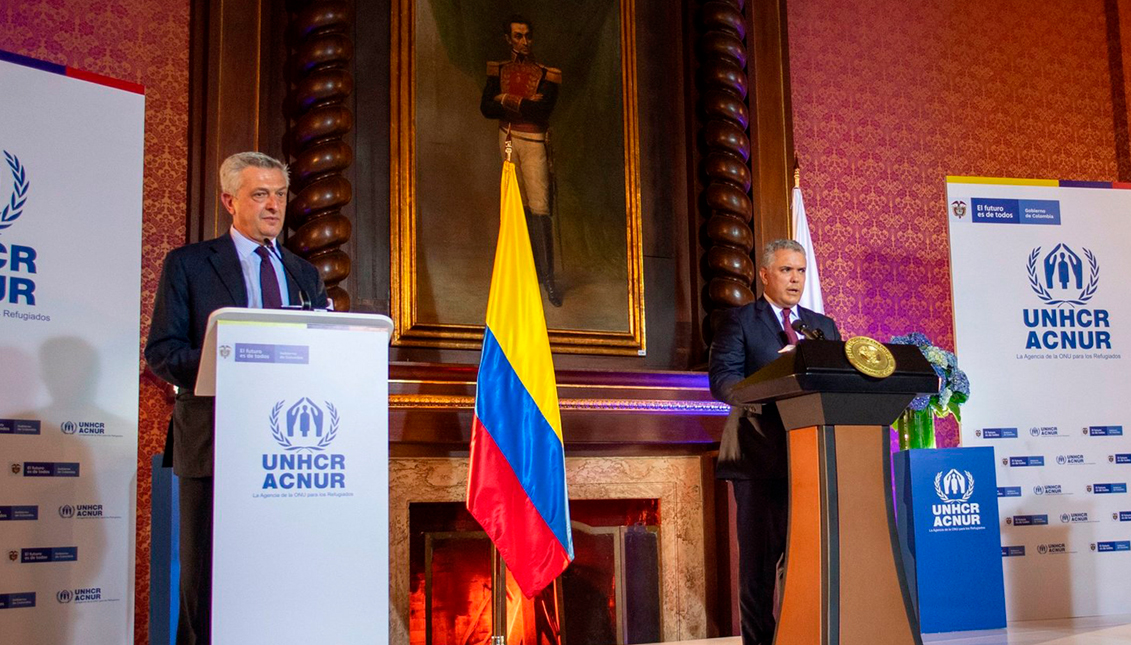
Colombia’s decision to legalize undocumented Venezuelan migrants sets a precedent for the United States
Venezuelans in Colombia will have temporary protected status for the next 10 years.
The nearly 1 million immigrants who have fled Venezuela due to conflict brought on by the current regime, subsequent sanctions and poverty will be given protective status in Colombia for 10 years.
Colombia said on Monday, Feb. 8, it will register hundreds of thousands of Venezuelan migrants and refugees currently in the country in a vulnerable state — without papers. The move will provide them with legal residence permits and open pathways to health care access and legal employment.
According to President Iván Duque, the new temporary protection statute allows Venezuelan migrants who reside in Colombia eligibility for 10-year permits. Migrants who are already currently on temporary status will be able to extend their stay in the country.
An estimated 1.7 million Venezuelan migrants currently live in Colombia, according to Reuters, over half of which had no legal status prior to Duque’s announcement on Feb. 8.
The new temporary protection (TPS) statute will begin as migrants leaving Venezuela find it increasingly difficult to settle in other South American countries due to land border closures brought on by the pandemic, as well as growing anti-immigrant policies.
The decision was made despite an Organization of American States’ warning last December that the total number of Venezuelan refugees and migrants living abroad could reach over 7 million in 2021, as the political crisis in Venezuela worsens.
Amid a pandemic and global economic troubles that came with it, immigration from Venezuela has burdened Colombia’s public health and education systems, especially border communities, reported Reuters. However, there are positive indications that granting residence status would alleviate the burden.
In his announcement, Duque commented that the registration of the undocumented Venezuelan migrants and refugees would benefit Colombia’s security agencies. It would also make the distribution of the COVID-19 vaccine more efficient because of proper documentation and tracking.
The announcement came with its requirements.
Migrants and refugees with irregular or undocumented status who entered Colombia before Jan. 31 are eligible, as well as migrants who legally enter Colombia within the next two years will also be allowed to apply for TPS status.
Those that do not register under the new temporary status will eventually be subject to deportation.
RELATED CONTENT
Filippo Grandi, the United Nations High Commissioner for Refugees said the move was one of the most important humanitarian gestures in decades. He was present at the time of Duque’s announcement.
U.S. Congressman Joaquin Castro (D-TX), Chairman of the subcommittee on Foreign Affairs also voiced his praise of Colombia’s humanitarian act.
“I commend Colombia on this historic move to protect Venezuelan refugees — a model of humanitarian assistance for the region. The United States must do our part, including by granting TPS status to Venezuelans living in the United States,” he wrote.
I commend Colombia on this historic move to protect Venezuelan refugees — a model of humanitarian assistance for the region.
— Joaquin Castro (@JoaquinCastrotx) February 9, 2021
The United States must do our part, including by granting TPS status to Venezuelans living in the United States. https://t.co/jjAD0M7XNZ
Colombia’s actions have been lauded, but they also set a precedent for the United States, which has been slow to offer similar humanitarian acts like expanded TPS status to immigrants from Central America, even those impacted by natural disasters.
On Jan. 26, Representative Darren Soto (D-FL) and Senator Tim Kaine (D-VA) discussed the need to expand TPS status to the nation, especially for Hurricane Iota and Eta survivors in Honduras, Guatemala, and other nations near the Yucatán peninsula.
At the beginning of February, The Congressional Hispanic Caucus collectively voiced disappointment after the House COVID-19 budget reconciliation blueprint didn’t include protections for essential workers, Dreamers, and Temporary Protected Status holders.
Human rights activists expect the Department of Homeland Security Secretary Mayorkas to implement the “sweeping” immigration change Biden has promised for months, to reform the country’s immigration policy away from a system that dehumanizes immigrants and refugees.
However, actions so far have not been anything but a return to the pre-Trump era, and TPS status has yet to be expanded within his executive orders.
As Castro wrote, Colombia’s actions just provided the U.S. with a “model.”











LEAVE A COMMENT:
Join the discussion! Leave a comment.